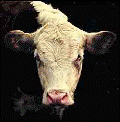Animal Science, Department of

Department of Animal Science: Dissertations, Theses, and Student Research
First Advisor
Galen E. Erickson
Date of this Version
5-2021
Document Type
Dissertation
Abstract
A feedlot finishing study evaluated the effect of replacing corn with dry-rolled wheat in diets containing wet distillers grains plus solubles (WDGS; Exp 1). Two studies were conducted to evaluate the effect of corn type [dry corn (DC), high-moisture corn (HMC), or a blend of dry and high-moisture corn (BLEND)] processed with either AutomaticRoller Mill (ROLL) or hammer mill (HAMMER) on steer performance, carcass traits, and nutrient digestibility (Exp. 2 and 3). In Exp. 1, steers were fed diets containing 100% dry-rolled corn (DRC) or a 50:50 blend of dry-rolled corn and wheat (WHEAT) in diets containing 12 (12WDGS) or 30% (30WDGS) WDGS (DM-basis). Substituting corn with wheat in finishing diets did not influence performance or carcass traits in steers when fed for 158-d regardless of WDGS inclusion; however, feeding increased amounts of WDGS did increase final BW, HCW, and improved ADG by 4.1% and G:F by 4.4%. Wheat can replace up to 50% of corn in a finishing diet regardless of WDGS inclusion. In Exp. 2, a finishing trial evaluated feeding DC, BLEND, or HMC processed with ROLL or HAMMER to steers fed for 134 d. Steers fed ROLL HMC were 4.7% more efficient with 55% lower fecal starch compared to HAMMER HMC, with no other interactions between grain type and mill type. Experiment 3 evaluated DC or HMC processed with either ROLL or HAMMER on nutrient digestion. There was a tendency for an interaction between corn type × milling method for DM and OM digestibility; however, there were no other interactions observed. Feeding HMC increased DM, OM, and starch digestibility compared to DC. Processing HMC with a roller mill improved feed efficiency compared to processing with a hammer mill, but milling method had little effect on performance or nutrient digestibility when fed as DC or BLEND.
Advisor: Galen E. Erickson


Comments
A DISSERTATION Presented to the Faculty of The Graduate College at the University of Nebraska In Partial Fulfillment of Requirements For the Degree of Doctor of Philosophy, Major: Animal Science (Ruminant Nutrition), Under the Supervision of Professor Galen E. Erickson. Lincoln, Nebraska: May, 2021
Copyright (c) 2021 Caitlin A. Coulson